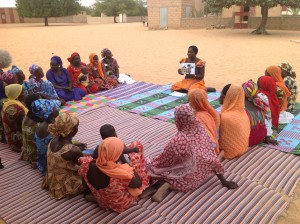Social Inequality & Health: Making Space for the Youth Voice
Happy International Youth Day! And, what better time to recognize and celebrate today’s generation of young people than alongside the recent release of the UN Sustainable Development Goals final proposal.
As the largest generation of young people the world has ever seen, their vigor and verve to define and transform the future will be boundless. However, this is by no means a small task. But, with the post-2015 millennium agenda serving as somewhat of a chaperone of the lessons learned by the last generation, their future trajectory is becoming much clearer.
Recognizing this, today’s post focuses on the newest addition to the post-2015 development agenda: addressing inequality. Social inequities are a major driving force behind poor health outcomes and, unfortunately, are a lived reality for many young people, especially in developing countries. However, the One Million Community Health Workers (1mCHW) Campaign doesn’t believe this has to continue being the case.
Evidence shows that if affordable medical and educational health interventions are not being administered at the community level, then social inequalities will continue to exacerbate people’s vulnerabilities to diseases, and as such, continue to degrade the lives of youth for generations to come. Using evidence-based health interventions within rural communities is vital to minimizing social inequities in health.
Consider this:
Currently, diarrhea, malaria, and pneumonia account for 44% of under-5 mortality and greatly affect the long-term development of the children who are affected. These are common and preventable diseases. But, because life-saving health interventions, such as integrated community case management (iCCM), do not effectively reach rural communities, young people continue to be negatively affected just because they live in a rural or remote location.
Low socioeconomic status and stigmatization are also major social inequalities that negatively affect health outcomes. This is the case with perinatal transmission of HIV. HIV, if diagnosed before or during pregnancy, and followed by the appropriate medical treatment and breastfeeding techniques, can be reduced to a transmission rate of less than 1%. Currently, transmission rates tend to range from 15-45% without any interventions. Yet, the absence of accessible education on HIV transmission, combined with the stigma and discrimination associated with HIV, remain a significant obstacle to increasing the demand for and uptake of essential HIV services. Culturally sensitive HIV counseling and preventative mother-to children transmission administered by CHWs have been proposed as potential ways to counter discrimination and increase understanding of the benefits surrounding essential HIV services.
Lastly, gender inequality is another critical social determinant of health. One of the leading causes of death in young females aged 15-25 years is complication due to childbirth and pregnancy. The majority of these deaths are easily preventable, curable even, but seeking and accessing maternal care is greatly undermined by distance to a healthcare facility, costs associated with healthcare (transport often constituting 50% of the direct costs), and the willingness to pay for women’s health. Sadly, it’s not surprising that the greatest proportion of adolescent females who do not access maternal health services are those who are poor and live in rural areas.
Gendered health inequities provide insight into why preventable diseases such as HIV, tuberculosis, and maternal complications are the major killers of young females. However, this does not have to be the case – community health workers (CHWs) are crucial to providing essential on the ground, gender-sensitive, pre and post-natal care and family planning services. Through the use of CHWs the international community, and more specifically today’s youth, can work to close pervasive rural health coverage gaps.
 The challenges today’s youth face are formidable. However, their importance is largely unrivalled. In uniting to actively address social inequities, through structural changes and well-developed interventions that help foster healthy, equitable, and socially inclusivity – such as community health workers – this generation of youth will be taking an invaluable step towards a legacy that will resonate now and for generations to come.
The challenges today’s youth face are formidable. However, their importance is largely unrivalled. In uniting to actively address social inequities, through structural changes and well-developed interventions that help foster healthy, equitable, and socially inclusivity – such as community health workers – this generation of youth will be taking an invaluable step towards a legacy that will resonate now and for generations to come.


Comments are closed